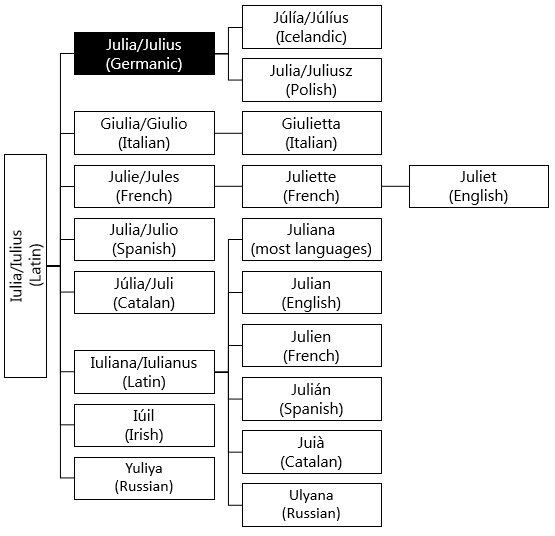
Julia, your name is really cool! It’s an ancient Roman family name meaning “Descended from Jupiter.” Because it was a family name, Julia and Julius were considered to be the same name, and I’ve included masculine versions.
This is a name within a name, so we’ll take three approaches to translating it.
- Leave Jupiter untranslated. Jupiter is actually an extended version of this god’s name. It’s a contracted version of Iovis Pater, or “Father Iovis.” (Note that at this time the V was pronounced like a W or a U) The “Iovis,” from the earlier “Diovis,” is the Latin cognate of “Zeus.” In compound words, it’s often shortened to “iov,” so that’s what we’ll use.
- Translate Iovis as well. This deity can be traced back to Proto-Indo-European, where he was named “sky,” because as the god of the sky, he was the sky.
- Cultural equivalent. That is Manwë, who is the Elven god of the sky.
Thus, I will translate this name as “Son/Daughter/Child of Sky/Iovis/Manwë.”
Quenya
Let’s tackle the Quenya-ization of “Iov” first. As I mentioned before, the V is pronounced as a W here, and the I is pronounced more like a Quenya Y. Tracing Quenya’s phonetic development, this would make the word *Yó, with the form used in with suffixes *Yow– (or *Yov– in Exilic Quenya.)
The word for “sky” in Quenya is Helle or Wilya (Vilya in Exilic Quenya). Wilya also means “air.”
And lastly, we’ll use Manwë, since it’s already in Quenya.
Then we’ll add suffixes meaning “daughter of” –iel, “son of” –ion, and the word meaning “child” Hína to the end.
Feminine: Yowiel (Exilic Yoviel), Helliel, Wiliel (Exilic Viliel), and Manwiel.
Masculine: Yowion (Exilic Yovion), Hellion, Wilion (Exilic Vilion), and Manwion.
Gender-neutral: Yóhína, Hellehína, Wilyahína (Exilic Vilyahína), and Manwehína.
For your elven characters…. None of these work as names. Yó means “both,” so at best it sounds like you’re referring to two children. The “Daughter/Son/Child of the Sky/Manwë” names, while they sound cool to us, mean something very different to the Elves. To them, these would mean that you are a creature created by Manwë. We have similar names for humans, Elves (Eruhíni – Children of Eru Ilúvatar) and Dwarves (Auleonnar – Children of Aulë). Basically, it’s like naming someone “Human Being.” The only time that racial names like this are used for individuals is if that individual is the odd one out, like how Aragorn was called Dúnadan while being the only human of Númenórean descent living amongst Elves in Rivendell. But, no elf would be called Manwehína, because Elves are Eruhíni. Maybe they would call their eagle friend that as a nickname.
But, you want a name for your Elf character, not their buddy the eagle. When Elves have names referring to deities, it’s always “friend/student of…” (the suffix –ndil) or “servant of…” (the suffix –ndur). These suffixes are gender neutral. Put them together and you get:
Manwendil and Manwendur.
If you want a name that’s a little more poetic and personal, I suggest “Sky-Gazer.” This way your character isn’t doing the taboo of pretending to be a god, but still having something to do with the Sky-God they like.
Feminine: Helletirme or Wilyatirme (Exilic Vilyatirme)
Masculine: Helletirmo or Wilyatirmo (Exilic Vilyatirmo)
Gender-neutral: Helletir or Wilyatir (Exilic Vilyatir)
Sindarin
The Sindarin-ization of “iov” is *Iaw and *Ió in compound words. This is a homonym with Iaw “corn,” which does make for strange names.
The Sindarin word for “sky” is Gwilwen or Gwilith.
The Sindar had two ways to refer to Manwë. One of them is just the borrowed Quenya word. The other is Aran Einior “the Elder King.” This one can’t be combined into a compound, so we won’t use it.
The name endings we’ll use are “daughter of” –iel, “son of” –ion, and “child” Hên.
Feminine: Iawiel, Gwilithiel, and Gwilweniel.
Masculine: Iawion, Gwilithion, and Gwilwenion.
Gender-neutral: Ióchen, Gwilithen, Gwilwechen, and Manwechen.
As with the Quenya names, none of these work in Middle-earth for the same reasons. Like with Quenya, we can make “friend/student of Manwe” Manwenil and “loyal follower of Manwe” Manwevor.
We can also do “Sky-watcher”: Gwilithdirn and Gwilwendirn (All gender-neutral)
But what’s really fun is that in Sindarin names, talking about the glint in one’s eyes is a common theme, as in Maeglin “Sharp Gleam [in his eyes]”. So, instead of “Sky-watcher”, how about “Sky-Gleam [in your character’s eyes]”, since the sky would be reflected in their eyes.
Glinwilith and Glinwilwen (Again, all gender-neutral)
![]()
Julia, I hope that you found this article interesting and useful!
If you’d like your name translated in this series, comment below and I’ll consider it for a future article!
Sources:
Hanks, Patrick & Hodges, Flavia. A Dictionary of First Names Oxford University Press. 1990. Pgs 184-185.
Wiktionary “Iulius” Last Edited: July 16th, 2021.
Wiktionary “Iuppiter” Last Edited: February 10th, 2021.
Wiktionary “Reconstruction:Proto-Indo-European/dyḗws” Last Edited: February 10th, 2021.

Mae Govannen !
Great article, as always !
I’d like to submit my name for a translation : Olivier (or Oliver)
I did some searching about the ethymology and found out that the origin of Olivier is NOT the latin “oliva” which gave its name to the olive fruit and tree. Indeed, the olive tree is called “olivier” in french but it is a language shortcut according to specialists. They came to that conclusion after realising that there was no male variation for the “oliva” at the time the name first appeared (one of the first trace of the name is in The Song Of Roland where it designates one of Charlemagne’s companions).
Thus, the real origin of the name “Olivier” would be the german name “Alfihar” instead, meaning … “Elf Army” or “Elf Host” !
You can’t imagine how happy I was when I figured out that my name originally contained the word “Elf” ! That’s the reason I would love to see it translated in Quenya and Sindarin.
Thanks for your work !